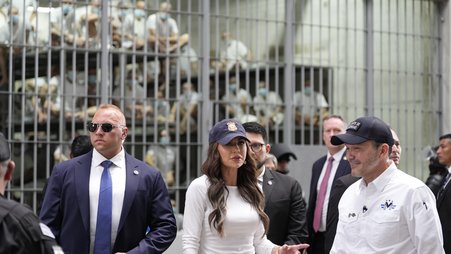This is the third in a series of profiles of independent journalists who use public records to hold local governments accountable. The second, about Hannah Bassett of the Arizona Center for Investigative Reporting, is here. The first, about Lisa Pickoff-White of the California Reporting Project, is here.
Michelle Pitcher knows a little something about the Texas criminal justice system.
The criminal justice reporter with the Texas Observer, who previously contributed to Pulitzer Prize-winning reporting at The Marshall Project, grew up in Dallas with family members incarcerated by the state.
But while Pitcher's investigative work gives her — and her readership — insight into the impact the Texas Department of Criminal Justice has on the lives of millions of Texans, it’s a complex that typically functions in the dark.
“I think that the system wouldn’t work without secrecy, or at least that’s the idea behind a lot of the actions and policies that happen in Texas prisons,” Pitcher said.
As a journalism master’s student at the University of California-Berkeley, Pitcher worked with The Marshall Project, which focuses exclusively on criminal justice and prisons reporting, on a Pulitzer-Prize winning story about the use of police dogs. “Ever since then, I’ve realized it’s really fulfilling and the area that I’m passionate about for personal and professional reasons,” Pitcher added.
But that doesn’t make the work any easier.
Access to public records in Texas is often blocked by officials hiding behind broad security and privacy excuses, making it difficult for journalists and the public alike to ask questions and get answers. Even when records requests are ultimately not denied, delays can still obstruct newsgathering.
“Even if the attorney general’s office ultimately decides I should get those records, months have passed,” Pitcher said.
But to Pitcher, these obstacles are just that — she’ll follow records requests for a year if she has to, or visit public information officers all over the state in person to obtain the information she needs.
“These laws and policies are in place to make it explicitly difficult to get answers to questions to see what’s going on,” Pitcher said. “If you request documents, there are dozens of exceptions that prison officials can cite.”
Officials often just raise blanket security concerns. “A lot of it is up to the warden’s discretion, too,” Pitcher added. “It’s all very tight-lipped by design.”
To fill in the gaps left by a lack of access to records, Pitcher relies on incarcerated people to tell their stories and show the public what is happening behind closed doors.
Michelle Pitcher"These laws and policies are in place to make it explicitly difficult to get answers"
“People are very brave and very willing to talk, knowing that it’s not going to be a secret and still willing to talk on the record,” Pitcher said. “As journalists, we should be seeking the people who are willing to tell those stories, because no one wants to feel like they’re shouting into the abyss. And people are shouting. People do want to talk.”
That said, the state prison makes it difficult for journalists to access the people incarcerated within the system, prohibiting journalists from interviewing the same person more than once within 90 days and limiting visits to an hour.
Pitcher uses her reporting to push past barriers — monitoring of emails and letters to incarcerated sources, guards and escorts present during media visits at prisons, incarcerated people moved across facilities — so she can inform the community.
“I’ve had it happen on multiple occasions where I was supposed to interview someone at a unit three hours away, and the day before the interview [they’re] at a different unit five hours away now,” Pitcher said. Although she has the geographical flexibility to follow her sources and navigate delay tactics, she says that is unfortunately “not possible for a lot of newsrooms” in the state.
Last year, Pitcher co-authored a story about the 200-year-long history of prison labor in Texas that pieced together prison reports, testimony, court filings, interviews of incarcerated people, and more to uncover the working conditions and death rates of these prison-run farms — some of which continue operating today.
To obtain these records, Pitcher and her team combined their reporting strategies and combed through the archives at the state libraries, filed records requests, and interviewed incarcerated individuals who had been injured while working.
Despite the obstacles in accessing information about current events in the prison system, Pitcher said that “Texas has a terrible history, and it’s all documented at the state libraries.”
“We had past, we had present, and we had official reports,” Pitcher said. “We had anecdotes, we had data. And it was just so rewarding to be able to put together a full picture.”
Although receiving her master’s in journalism helped shape her career path and train her in public records-seeking, Pitcher emphasized that anybody who wants to find out more about our government can request public records and report on them.
“As journalists, we have no real special rights or powers,” Pitcher said. “We are just members of the public who are availing ourselves of public record laws. All you have to do to be a journalist is do journalism with ethics.”
For more on this topic, see our two-part series on covering the mass incarceration system.





